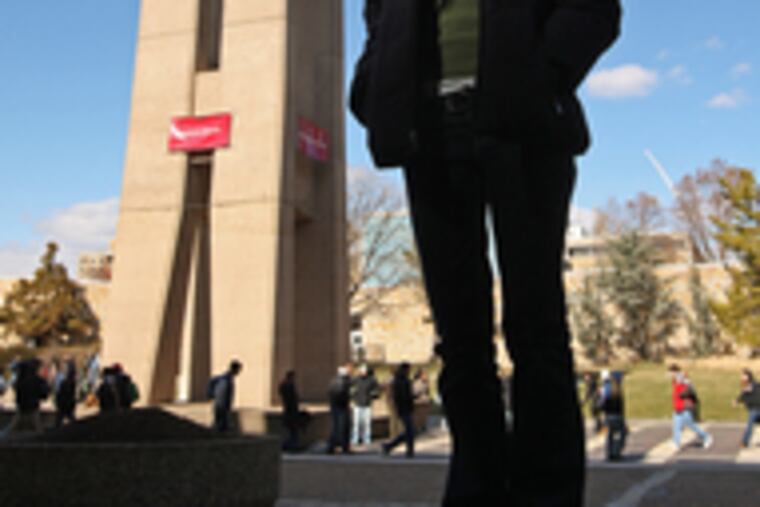Temple students reflect findings of religion poll
Julie Myers, 18, was not surprised to learn that a new study of American religious identity shows many Americans leaving their parents' faith.

Julie Myers, 18, was not surprised to learn that a new study of American religious identity shows many Americans leaving their parents' faith.
"I went along with it [Christianity] through most of my childhood," said Myers, a freshman at Temple University whose parents are active in their Presbyterian congregation in Doylestown.
"But I guess I'm trying to find certain things out on my own," she said last week, sitting in the cafeteria at Temple's student center.
"I'm exploring whether or not the man Jesus actually existed. If he performed all those miracles, you would think other people would have written about him" besides the authors of the gospel.
Twenty-eight percent of all American adults have departed their childhood religious tradition, according to a 2007 survey of 35,000 people by the Pew Forum on Religion and Public Life released last week.
If the number of Protestants who changed denominations is included, that figure jumps to 44 percent of all adults.
"I guess the most striking thing we found was the fluidity of religious identity in this country," said Greg Smith, a Pew fellow and an author of the report.
What's more, 16 percent of adults said they belonged to no religious denomination - twice the share reported in a 1990 survey. Unaffiliateds are now the nation's fourth-largest religious category - what Pew calls the "biggest gainer" in the nation's "very competitive religious marketplace."
The full report is online at
» READ MORE: http://religions.pewforum.org/reports
.
But it would be a mistake to suppose that people who identify as "nothing in particular" are indifferent to ideas of God, grace, enlightenment or spirituality, Smith cautioned.
"The unaffiliateds are really quite diverse," he said last week. "Some told us religion isn't really important in their lives," while others said it mattered a great deal.
Myers, who hopes to major in music education, said she found religion the most compelling question in her life.
She no longer thinks of herself as Presbyterian and has looked into Judaism and Buddhism, but she is centered in her skeptical study of the Bible.
"Why didn't Abraham question God?" she wondered. "If God made people rational, they should ask questions."
At a table nearby sat Amanda Ramsaran, a 19-year-old film and media-arts major from Newark, Del.
She smiled when asked whether she had departed the religious tradition of her childhood.
"My dad's side is Hindu. My mom's is Muslim," she said between bites of a turkey wrap. Although neither parent was particularly observant, "there's always been tension in the family" because of religious differences.
"I didn't want to pick sides," she said, "so I am learning about Christianity."
Ramsaran is not sure what she yet believes about Christianity. "Belief is an act of construction," she said. But she reads the Bible and supposes she qualifies as a "generic Christian" in the Protestant tradition.
She doubts she will ever join a Protestant denomination, she said, because "the denominations just seem to be trying to break things [Christianity] up, and I don't want it to be."
More than half of Americans told Pew they were comfortable in the faith in which they grew up, however. Like them, George Pisasecki, 19, plans to stay put.
The Temple health major from Ridley Park described his father as a "lukewarm Baptist," but his mother and her father were devout Catholics.
"I grew up being Catholic, and I like it," he said. "Everything about it I like."
Likewise, Tracey Jones, 20, a pre-dental major from New York, said she "never wanted to switch" from the Baptist faith of her childhood. "I'm just used to it," she said. "I'm comfortable."
Sitting with her was Naya Smith, a kinesiology major from North Jersey. She said she was raised Presbyterian "and it's working fine for me."
Her parents became Presbyterian, she said, when they emigrated from Trinidad and discovered a "very open church that was welcoming of foreigners and gays and lesbians. That's my parents' values, too."
"You welcome gays and lesbians?" Jones asked her friend and frowned. Her Baptist congregation did not approve of such things, she said. "Well, it's not like we burn them at the stake," she said, "but no."
Smith just shrugged. "I believe I'll stay Presbyterian," she said, because she liked her congregation's openness. "But I might find another" denomination. "They're all the same."
Smith, coauthor of the Pew study, said it was not clear whether the large numbers of young people who do not identify with any particular denomination represented an enduring trend.
"Many people choose something when they start a family," he said. "So we don't know if this [disaffiliation] pattern will continue in this age cohort."
Neither does Carly Shook, a 22-year-old Temple senior from Harrisburg.
Although her mother was baptized Catholic, "we were raised in my father's church, which is Calvary United Methodist," she said. "He likes for us to be involved, and so we [her sister and brothers] were acolytes and sang in the choir - things like that."
But in her late teens she began to balk at her father's strong views. "Sometimes a parent pushes too hard," she said, "and you end up resisting what you're forced to believe."
And so she has broken, for now, with Methodism. "I believe in karma" she said, "though I don't know if that counts as 'religion.' " She described her understanding of karma - a tenet of both Hinduism and Buddhism - as a "moral concept: If you do well, you will be rewarded; your past will catch up with you. So, do well."
Ultimately, though, she expects she will return to Methodism "because it's the way I grew up."